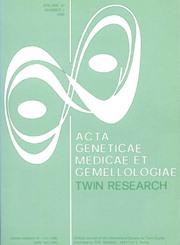Article contents
Confirmatory Factor Analysis of Reading and Mathematics Performance: A Twin Study
Published online by Cambridge University Press: 01 August 2014
Abstract
Reading and mathematics performance data from a sample of 264 reading-disabled twin pairs and 182 matched control twin pairs were subjected to multivariate behavior genetic analysis. The factor structure of reading and math performance measures was found to be highly similar for both groups. Consistent with previous findings obtained using alternative methods, a significant heritable component to individual differences in reading performance was found both within the reading-disabled (h2 = 0.78) and control (h2 = 0.74) twin samples. In addition, a substantial genetic influence on mathematics performance was found (h2 = 0.51 and 0.60 in the reading-disabled and control samples, respectively), although shared environmental influences common to both members of a twin pair also contribute significantly to the variance in math scores of both groups (c2 = 0.44 and 0.37). Moreover, genetic influences accounted for 98% of the observed correlation between reading and math performance within the sample of reading-disabled twin pairs, and for 55% of the observed correlation in the control sample. Thus, individual differences in both reading and mathematics perfomance are highly heritable and appear to be caused by many of the same genetic influences.
Keywords
- Type
- Research Article
- Information
- Acta geneticae medicae et gemellologiae: twin research , Volume 41 , Issue 4 , October 1992 , pp. 287 - 300
- Copyright
- Copyright © The International Society for Twin Studies 1992
References
REFERENCES
- 6
- Cited by


